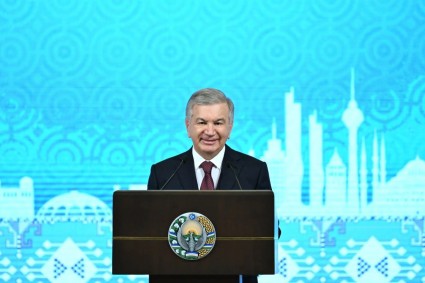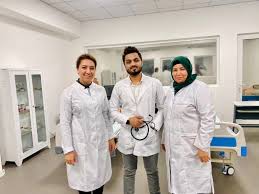The United Nations, in collaboration with the Government of Karakalpakstan, announced the launch of two projects to tackle pressing environmental and health issues in the region.
The projects, supported by the Multi-Partner Human Security Trust Fund for the Aral Sea Region include: the UNICEF project, “Enhancing Climate-Resilient and Safe Water, Sanitation, Hygiene, and Health Services for the Most Affected Communities in Four Districts of Karakalpakstan,” and the joint project by UNDP and FAO, “Building Knowledge and Skills of Local Partners and Communities to Address Environmental Insecurities through Innovative Air, Land, and Water Management Solutions in the Aral Sea Region.”
"The launch of these projects marks a significant milestone in our collective efforts to address the profound environmental and health challenges facing the Aral Sea region. By fostering resilience through innovative solutions in water management, health services, and community empowerment, we are laying the groundwork for a sustainable future in Karakalpakstan," said the United Nations Resident Coordinator in Uzbekistan, Sabine Machl.
The UNICEF project aims to improve access to safe drinking water and climate-resilient health services for over 15,000 people in the districts of Muynak, Kungrad, Bozatau, and Takhtakupyr. It also seeks to strengthen the monitoring systems of the Ministry of Health of Karakalpakstan and ten mahallas for data-driven climate-resilient WASH interventions, while empowering over 5,100 children and adolescents with knowledge on inclusive climate-resilient WASH services.
“In today’s world, climate-resilient WASH, schools, health care centers have become an imperative. UNICEF is happy that this programme will have a whole-community approach, renovating water treatment facilities and installing water pipeline networks in 10 remote communities,” said Regina Castillo, UNICEF Representative in Uzbekistan. “Investing in children is investing in the future. UNICEF remains committed to collaborating with the Government of Karakalpakistan to ensure that all girls and boys in the region fulfill their rights to health and education, safety and protection,” she added.
The joint UNDP and FAO project focuses on empowering local partners and communities with the knowledge and skills needed to address environmental insecurities. It aims to develop practical solutions in air, land, and water management, ensuring that the communities can adapt to and mitigate the effects of climate change. Moreover, the project will focus on implementing new approaches to water purification, afforestation, and soil stabilization in the Region. These activities have the potential to directly benefit over 376,000 residentsin three northern districts of Muynak, Kungrad, and Takhtakupir particularly women in at-risk communities, with indirect impact extending to 200,000 more people and building on the results of the previous projects.
Akiko Fujii, UNDP Resident Representative in Uzbekistan noted, "Through our collective efforts, we have transformed challenges into opportunities for the communities in the Aral Sea region. By enhancing rural infrastructure, and empowering youth and women with essential skills, improving access to clean water, supporting innovative business ventures and green farming, we are giving people the tools they need to thrive. As we move forward with renewed attention to air, water, land quality and ecosystems, we are committed to building on these achievements, ensuring that progress touches every life in the region."
“The proposed programme is developed to address multiple insecurity challenges in the Aral Sea region stemming from the ongoing Aral Sea crisis,” said Sherzod Umarov, Assistant FAO Representative in Uzbekistan. “Our approach aligns closely with the concept of human security, with a specific focus on addressing environmental, food, and health insecurities. This alignment is evident through the programme's core objectives, outcomes, and targeted outputs, ensuring a comprehensive and context-specific strategy. By promoting the integration of the human security concept, this programme aims to enhance overall environmental and health security and improve the well-being of vulnerable groups, with special attention given to women, children, and youth. This approach is crucial for fostering resilience and sustainability in the Aral Sea region.”
Additionally, on 16 August, the UN Joint Programme, “Laying the Foundations for People-Centred, Climate-Resilient Primary Health Care and Water, Sanitation, and Hygiene Practices at Healthcare Facilities and Schools,” was officially completed. Since January 2023, this programme has achieved outcomes in the health and WASH sectors across the districts of Kegeyli, Shimbay, Karaozek, Kungrad, and Nukus city.
Key achievements of this programme include the introduction of a new primary health care model with an innovative financing mechanism, which has strengthened the health system and laid the groundwork for universal health coverage. Over 826 healthcare professionals have enhanced their skills, benefiting nearly 250,000 people. The programme has also made significant strides in early identification and treatment of cervical cancer, benefiting more than 5,700 women, and improving WASH facilities for over 320,000 people.
"The project marked a significant step forward in addressing the environmental and health challenges faced by the people of Karakalpakstan. The cervical cancer screening project in the Republic of Karakalpakstan, spanning from 2020 to 2024, aimed to enhance early detection and treatment of cervical cancer. A total of 56,000 women aged 35-55 were tested. The project trained over 500 healthcare professionals and established eight labs for HPV testing, significantly increasing diagnostic and treatment capacity. 1023 women were diagnosed with precancerous conditions of the cervix, enabling timely treatment and preventing the progression to a fatal disease. It highlighted that a comprehensive screening program could save 3,265 lives and reduce healthcare costs by USD 29 million by 2030. This project, along with efforts to engage volunteers in health and hygiene education, underscores the importance of comprehensive, community-driven health initiatives," said Nigina Abaszada, UNFPA Resident Representative to Uzbekistan.
The success of these initiatives is a result of the invaluable support and collaboration of partners such as UNICEF, WHO, UNFPA, the Ministry of Health, the Ministry of Pre-school and School Education, the State Health Insurance Fund, Karakalpak State University, and the Global Green Growth Institute.
Since its establishment in late 2018, the Multi-Partner Human Security Trust Fund has supported nine joint programmes amounting to USD 16 million, benefiting over 294,000 people, including youth, women, and the elderly. These programmes have promoted sustainable rural development, climate change adaptation, biodiversity rehabilitation on the dried Aral seabed, economic and food security, and improvements in the health system of Karakalpakstan.














